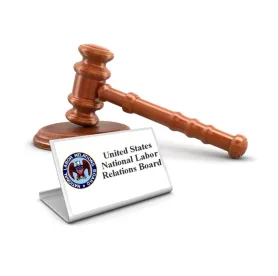National Labor Relations Board (NLRB) General Counsel (GC) Jennifer Abruzzo mandated the seeking of more aggressive remedies in unfair labor practice (ULP) cases. Office of General Counsel Memorandum GC 21-06, Seeking Full Remedies (issued Sept. 8, 2021). In a memorandum issued to NLRB field offices, Abruzzo directed staff to seek a variety of new remedies in ULP cases. Currently, monetary remedies for violations of the National Labor Relations Act (NLRA) have been limited to restoring an employee’s actual compensation lost because of an employer’s (or a union’s) ULPs — which is how the Board defined “make whole” relief. In cases alleging unlawful firings, the memo instructs staff to seek consequential damages, front pay, liquidated backpay, and expanded remedial measures in cases involving firings of undocumented workers. Where the ULP charge alleges unlawful conduct during union organizing, staff are to seek union access to employees, more disclosure of employee contact information, reimbursement of organizing costs, and expanded obligations regarding NLRB notices. In cases alleging unlawful failures to bargain, the memo instructs staff to seek remedies including specified bargaining schedules, required progress reports on bargaining status, and reimbursement of negotiation expenses. Relatedly, Abruzzo has advocated review of the NLRB’s decision in Ex-Cell-O Corp., 185 NLRB 107 (1970). In Ex-Cell-O, an employer unlawfully refused to negotiate a collective bargaining agreement with the certified union. The then-GC urged the NLRB to award backpay based on speculation as to what the employer would have agreed to in a contract. The NLRB refused to base backpay awards on conjecture. If the NLRB now decides to reexamine monetary damages arising from refusals or delays in bargaining, it could effectively reverse that stance.
GC Abruzzo mandated a series of changes that require significantly more onerous terms in ULP settlements. Office of General Counsel Memorandum GC 21-07, Full Remedies in Settlement Agreements (issued Sept. 15, 2021). GC Abruzzo issued a memorandum directing NLRB regional staff to seek stronger than ever settlement terms. In settlements, the NLRB has historically required close to full backpay of wages and employment reinstatement. The GC seeks to insist on additional monetary and non-monetary remedies for settlement of ULP charges — without any actual finding that the respondent (generally, employers) violated the law. Such additional remedies include health insurance premiums and accrued medical costs, front pay, consequential damages like interest and late fees on credit cards accrued to cover living expenses, and affirmative non-monetary terms such as a letter of apology to employees, sponsorship of visas, payment of costs associated with job placement services, and expanded notice posting requirements. The memo also suggests that non-admissions clauses (which have been routinely included in settlements for decades) should be included in settlements only as an exception. Some regions have reportedly already begun refusing to include such provisions in settlements. The extent to which demanding such expanded remedies will deter parties from settling matters before trial remains to be seen.
GC Abruzzo stated her office’s position that college athletes are “employees” under the NLRA. Office of General Counsel Memorandum GC 21-08, Statutory Rights of Players at Academic Institutions (Student-Athletes) Under the National Labor Relations Act (issued Sept. 29, 2021). In this memo, the GC reasoned that the athletes generally are under the control of their universities and are compensated for their services, meeting the NLRA’s definition for “employees.” GC Abruzzo refrains in the memo from using the term “student-athlete,” stating her belief that the term has been used to “deprive those individuals of workplace protections.” The memo directs NLRB staff to pursue cases alleging athletes are improperly excluded from NLRA coverage, setting the stage for the NLRB to potentially find such athletes are eligible to unionize, have the right to collectively bargain their working terms and conditions, and are otherwise covered by the NLRA’s protections. GC Abruzzo’s position echoes that of former GC Richard Griffin, whose 2017 memo finding university student-athletes to be employees was reversed by Trump-era GC Peter Robb.
The NLRB must reconsider its newest ruling on contractors’ right of access to private property to engage in union activity. NLRB v. Local 23, American Federation of Musicians, No. 20-1010 (D.C. Cir. Aug. 31, 2021). The U.S. Court of Appeals for the D.C. Circuit remanded a case to the NLRB to revisit its standard for determining contractors’ access rights. Musicians represented by Local 23 were employed by the San Antonio Symphony, which had a contract to perform at the Bexar Performing Arts Center Foundation’s Tobin Center. The musicians also performed for the Ballet San Antonio at the Tobin Center. To cut costs, the Ballet reduced the number of paid performances for the musicians. To protest the move, the musicians distributed leaflets at the Center criticizing the Ballet. The Center asked the contractors to move to a sidewalk, leading Local 23 to file a ULP charge. Applying then-current case law set in Bexar County Performing Arts Ctr. Found. 368 NLRB No. 46 (Aug. 23, 2019), the Board found the Center lawfully asked the contractors to move, because they did not work “regularly and exclusively on the property” and the contractors had “one or more reasonable alternative means” to communicate. Local 23 sought review at the Court of Appeals. The Court found the NLRB acted arbitrarily in drafting its new rule in Bexar, because the terms “regularly” and “exclusively” were poorly defined, and the examples the NLRB used to explain the new test seemed in conflict with the words of the test themselves. The Court remanded the case to the Board “to proceed with a version of the test it announced … or develop a new test altogether.” Given its Democratic majority, such a new test is likely to protect or expand contractor employee access.
Congressional Democrats continue their attempts to pass key components of the Protecting the Right to Organize Act (PRO) Act. Continuing an effort started over the summer, some legislators continue to advocate using the congressional “budget reconciliation” process to pursue PRO Act goals after that measure failed to independently advance through Congress. After the U.S. Senate passed a $1 trillion infrastructure bill in August, efforts began in the House of Representatives to adapt the Senate bill for House consideration. That process, referred to as budget reconciliation, culminates in votes by both chambers on the “reconciled” budget measures. Significantly, the budget reconciliation process allows passage of budget measures by a simple majority in the Senate and House, as opposed to other legislative measures, which if subject to a Senate filibuster (requiring a supermajority for advancing to a final vote). The most recent version of the House reconciliation bill (which is a $3.5 trillion bill currently comprising 2,468 pages) appears to have stalled after key Democrats joined Republicans in balking at the bill’s cost, potentially meaning Democrats lack the majority needed for passage. Among other key components of the PRO Act contained in the latest House reconciliation bill are new civil penalties for employers found to violate the NLRA (in some cases, up to six figures per violation), and personal liability for directors and officers. The provisions also would make it a violation for employers to pursue certain common measures, like permanently replacing economic strikers, locking out employees, and requiring attendance at employer campaign meetings.
Co-authored by Christopher M. Repole









 />i
/>i

